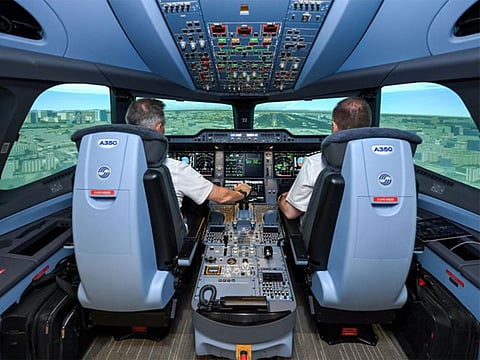Emirates invests $48 million in pilot, crew training systems
Investment reflects the airline's commitment and high standard in crew training

Dubai: In advance of its much-awaited Airbus A350s joining the fleet, Emirates has invested around US$48 million in full suites of cutting-edge equipment and systems to support both pilot and cabin crew training.
The suites include three full flight simulators integrated with innovative pilot support systems (PSS), a fixed base training device, a cabin emergency evacuation trainer and a door trainer. This investment reflects the airline's commitment to achieve the ultimate standards and excellence in crew training.
The PSS is an industry first and was fully conceptualised in-house by Emirates with a view to optimising the training experience.
During the briefing phase, it allows trainees to carry out an interactive flight deck set-up, including building a flight plan, in a fully immersive environment. The set-up is recalled once the trainees move inside the simulator to resume their training. The PSS' debrief mode allows the instructor to playback the recorded session to review crew performance.
The airline's first A350 full flight simulator received a level D qualification, the highest for this type of simulators, from the European Union Aviation Safety Agency (EASA). The initial qualification was achieved with zero findings, another remarkable feat in the simulation industry. The advanced technology not only enhances training efficiency, but also empowers pilots to confidently master the skills required for smooth operations.
Emirates has ordered 3 full flight simulators for its A350 fleet. The second A350 simulator is currently in its onsite acceptance stage and is scheduled to receive EASA approval in November.
The A350 fixed base training device replicates the flight deck, using visual and audio systems to make training sessions as realistic as possible.
Capt Bader Al Marzooqi, Emirates' Senior Vice President Flight Training, said, "Spearheading innovation is at the core of Emirates' DNA, and that is reflected in our newly acquired A350 training equipment suites and our advanced pilot training facility set to open later in the year. We're proud that we now have the potential to expand our pilot training capacity by 54 percent. With our investments in the new simulators and systems, our pilots and cabin crew are equipped, trained and supremely confident to manage any operational challenge safely and competently."
Currently, the airline has trained nearly 30 pilots and 820 cabin crew members. By end-November, more than 50 pilots will have completed their training on the A350 full-flight simulators prior to the aircraft's entry into service. Emirates' pilots and cabin crew receive robust, evidence-based training, delivered inhouse by highly experienced instructors in specially designed environments.
In past June, Emirates announced a joint collaboration with IATA and Airbus to deliver an enhanced Competency-Based Training and Assessment programme for the A350 type rating.
For its next era of growth, Emirates has 65 A350s and a mix of 205 777Xs in its order book that will support the airline's expansion goals and provide flexibility to launch new, and better serve, existing routes on its network.
Emirates is all set to open its advanced pilot training facility later this year. The 63,318 sq.ft. facility can house 6 full-flight simulator bays for the A350 and Boeing 777X aircraft.
Across the airline's pilot training facilities, Emirates' aviators will be able to hone their flying skills with 17 full flight simulators offering a capacity of more than 130,000 training hours a year.
![Pakistan Embassy and Consulate stress relying only on verified sources before travelling. [Illustrative image]](http://media.assettype.com/gulfnews%2Fimport%2F2024%2F01%2F11%2FStock-PIA_18cf721b120_large.jpg?w=320&auto=format%2Ccompress&fit=max)

